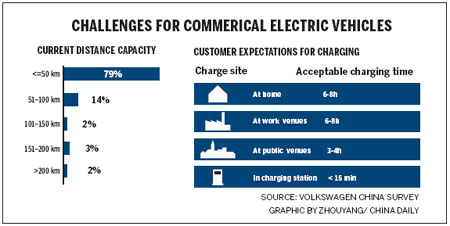Cars
Volkswagen gears up in race to electric vehicles
By Gong Zhengzheng (China Daily)
Updated: 2010-11-08 14:31
 |
Large Medium Small |
Auto giant reveals plans to begin local production of 'blue-e-motion' models
SHENZHEN - Germany's Volkswagen Group, the top-selling carmaker in China, is presenting its electric drive designs and technologies at the 25th World Battery, Hybrid and Fuel Cell Electric Vehicle Symposium & Exhibition (EVS25) that opened on Nov 4 in the southern metropolis.
The auto group, one of the largest exhibitors at the EVS25, is aiming to gain the initiative in the contest to offer cleaner mobility to increasingly prosperous motorists in the world's No 1 vehicle market.
Volkswagen's exhibits include three new models equipped with innovative electric drive technologies - the Golf blue-e-motion, Lavida blue-e-motion and Touareg Hybrid - as well as its E-Lab that enables audiences to learn more about the future of electric vehicles.
"Electric vehicles are the right direction for future mobility," said Dr Karl-Thomas Neumann, president and CEO of Volkswagen Group China in an interview with China Daily. "Volkswagen Group China will provide affordable and attractive electric vehicles to Chinese customers."
The group will work with its two Chinese joint ventures - FAW Volkswagen and Shanghai Volkswagen - for local production of the Golf and Lavida blue-e-motion models between 2013 and 2014, Neumann said.
The German carmaker will also export the Touareg Hybrid to China in 2011.
Neumann, who was appointed president and CEO of Volkswagen Group China in September, is an expert in the global electric vehicle (EV) industry. Before accepting his current position, he headed Volkswagen Group's EV business.
Desire to lead
Analysts say the appointment of Neumann indicates Volkswagen Group's intention to take the lead in China's electric vehicle market.
Electric vehicles became a hot topic last year as China's auto industry faced mounting pressures for environmental protection and fuel conservation.
A phalanx of foreign and homegrown carmakers including BMW, Mercedes-Benz, Nissan, Dongfeng, Chery and Geely are also planning to launch electric vehicles.
"Volkswagen Group China has already established a very clear E-Mobility strategy and roadmap - we will introduce hybrid power and E-Mobility technologies to China and endeavor to become a market leader in China's electric vehicle market by 2018," Neumann said.

Next year, a zero-emission demonstration fleet of Golf and Lavida blue-e-motion cars will be rolled out for test drives in the nation's major cities, according to Volkswagen Group China.
Volkswagen will invite research institutions, government agencies, the media and customers to experience its EV technologies. Feedback from test drives will help the carmaker and its Chinese partners develop the most suitable EV models for the market.
"EV technologies still face many challenges on the road ahead, such as high battery costs and insufficient numbers of battery charging stations," Neumann said.
"But advancement in electrification technologies will clear these obstacles step by step."
Noting the problems, he said "Volkswagen Group will follow a four-step roadmap for EV development, keeping pace with technology sophistication and market readiness."
The stages include:
Mild hybrid vehicles with start-stop systems and recuperation
Full hybrid vehicles with start-stop systems, recuperation, power assist and 2 kilometers of electric-powered range
Plug-in hybrid vehicles with start-stop systems, recuperation, power assist and over 20 kilometers of electric-powered range
Totally electric vehicles with over 100 kilometers of electric-powered range such as the Golf blue-e-motion.
Government support
Governments at various levels in China are also backing the development of electric and other new-energy vehicles.
Owners of purely electric cars in five pilot cities - Shanghai, Changchun, Shenzhen, Hangzhou and Hefei - have been eligible for a subsidy of 60,000 yuan since June this year. Owners of plug-in hybrid cars can receive subsidies of up to 50,000 yuan.
Volkswagen has a long history of developing electric cars. In 1900, its 25-year-old chief designer Ferdinand Porsche stunned the world with the electric Lohner-Porsche.
With electric hub motors on the front wheels, the Lohner-Porsche was lauded by the press as an "epoch-making masterpiece".
Despite its aggressive EV strategy, Neumann said Volkswagen will further tap potential of internal combustion engines by slashing fuel consumption and emissions.
In 2007 Volkswagen Group China began introduction of two of its core BlueMotion technologies - the TSI engine and DSG transmission.
The TSI - turbocharged stratified injection - engine enables highly efficient combustion of fuel while the DSG - or double-shift gearbox - transfers power smoothly and efficiently for optimal use of energy.
The carmaker now has TSI engine production sites in Dalian, Shanghai and Changchun. It also has a DSG plant in Dalian.
Volkswagen's China-made models with TSI engines and DSG transmissions include the Lavida, Magotan, Sagitar and Skoda Octavia Mingrui.
Target reached
The efficient technologies have also helped Volkswagen Group boost sales.
In the first three quarters of this year, Volkswagen's China sales surged by 39 percent year-on-year to 1.48 million vehicles. The figure, up from 1.4 million units for the whole of last year, enabled the German carmaker to maintain its two decades of leadership in China's passenger car market.




